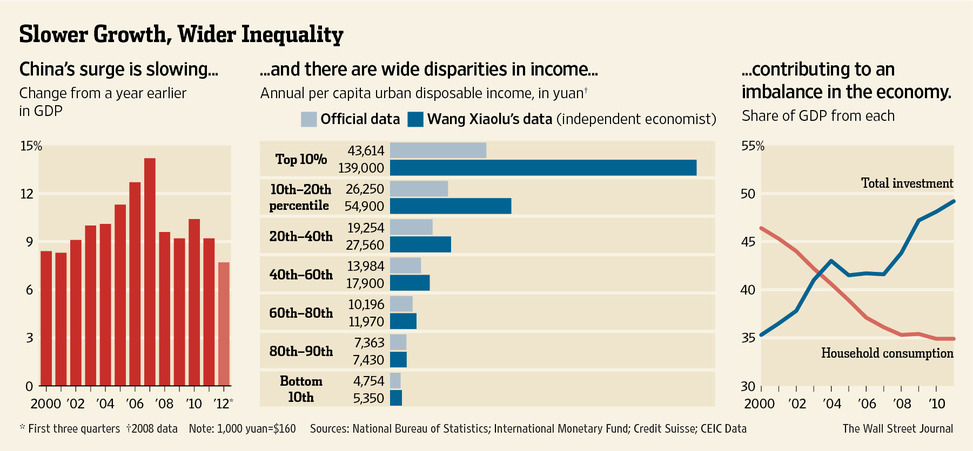
Here it is from a WSJ piece:
China's latest evidence of sputtering growth underlnes a dilemma for its incoming leaders: They can shore up the economy by doubling down on an exhausted growth model, or take a risky political bet on reforms that could worsen the slowdown in the short term.
That not only captures where China is today (as in, this quarter), it basically captures where China is for the next decade or so. I mean, what happens to a "communist" party when the progressive era necessarily arrives?
Well, the first instinct is to try and run it yourself, maintaining single-party rule, but that's basically impossible. The pain meted out will create blowbacks, no matter whether you direct it at the "gilded age" elite or the increasingly demanding middle class or the decidedly put-upon working class. Worse, in the end, you'll need to disappoint them all on some level, which is where that throw-the-bums-out dynamic comes in handy: a party wins and does what is necessary, outlives its welcome, and then gets tossed. But in a sustainable progressive era, the opposition party that then comes in also does its bit, just tackling a different segment until its welcome is worn out. And so on.
That's how the US did it 1890 onward. When the Dems or GOP won, they won big and ruled big and changed big, and we got a much better country for it.
China lacks that ability due to the stultifying nature of single-party rule, which, contrary to our green-eyed fantasies, is NOT more agile or adept or bold or visionary in its leadership. Instead, it is self-preserving in the extreme. It's bread-and-circuses. It rules by fear and in fear of its own public.
The WSJ piece is all about giving more money to consumers and the "dangers" inherent to that process. It's a proxy description of the coming democratization of China, because giving money to consumers is giving decision-making power to the average citizen, versus hoarding it within the elite. It's the economic prelude to the democratic denouement.
China has already reached the democratizing point. I still believe it will muddle along with years before taking the plunge, in part because of that stultifying nature of single-party rule. If we're lucky, Xi Jinping will be a real leader, but even if he is, we'll most likely have to wait a good 5-7 years to see that turn out. That's how long it will take him to consolidate power as the evidence for the needed change piles up all around him.
And yes, those two dynamics are deeply intertwinned.
America's job? Don't provide any stupid excuses for Beijing to avoid facing their own realities.
The "strategic pivot" is just such an excuse, which tells me Obama and Co. don't really understand China.
Sad to say, Romney's answers are beyond stupid and have no chance of being implemented (thank God).